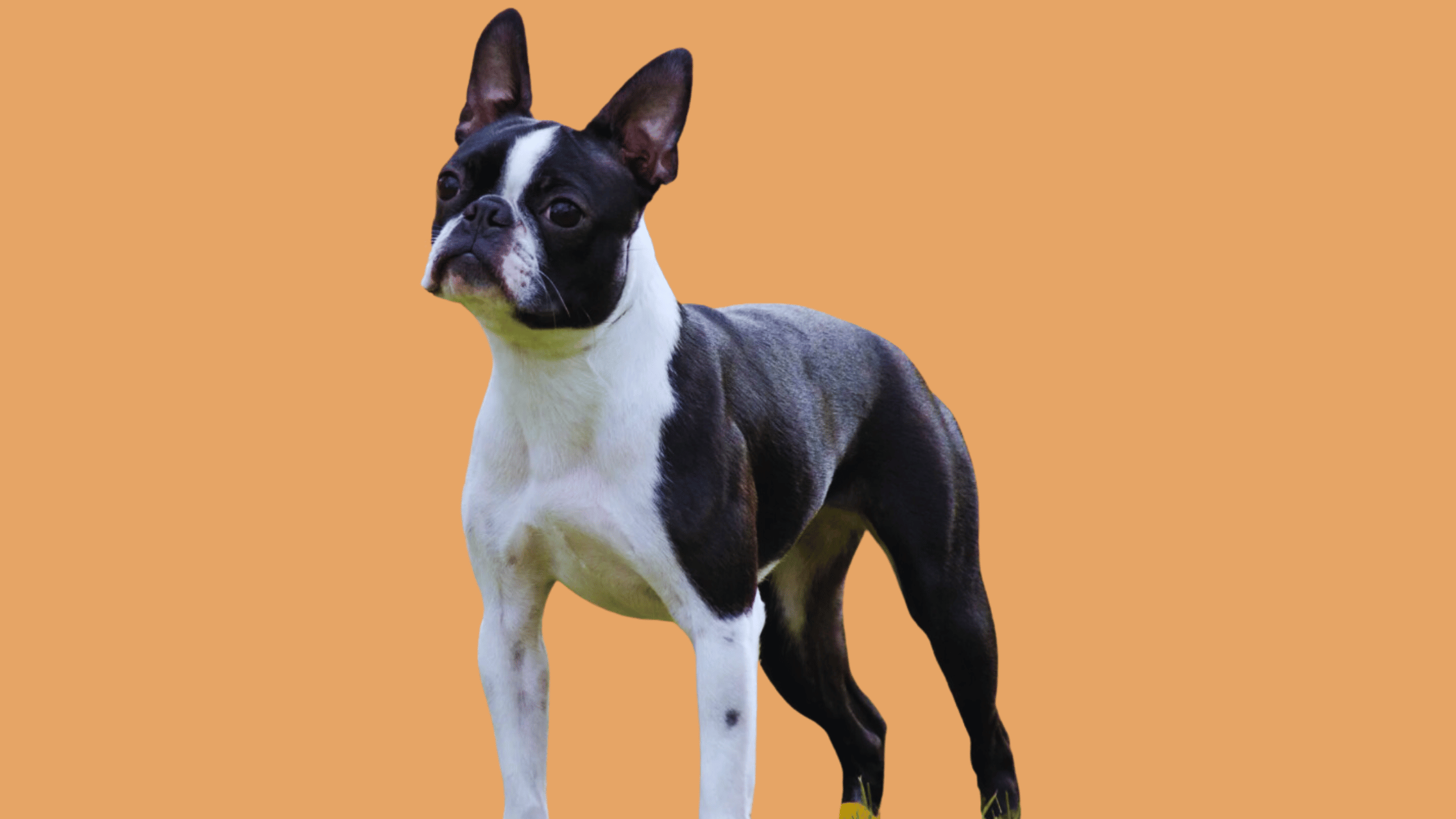Did you know Boston Terriers were once known as ‘American Bull Terriers’? These tuxedo-clad seducers have a charming history and a lot of love to give.
Are you wondering if a Boston Terrier is the right dog breed for you?
Choosing a dog is a big decision! You might be worried if a Boston Terrier’s short snout causes breathing problems or curious about how easy they are to train.
This guide will answer all your questions and give helpful information about Boston Terriers, from their playful personalities to their unique needs.
Are you thinking of Bringing Home a Boston Terrier?
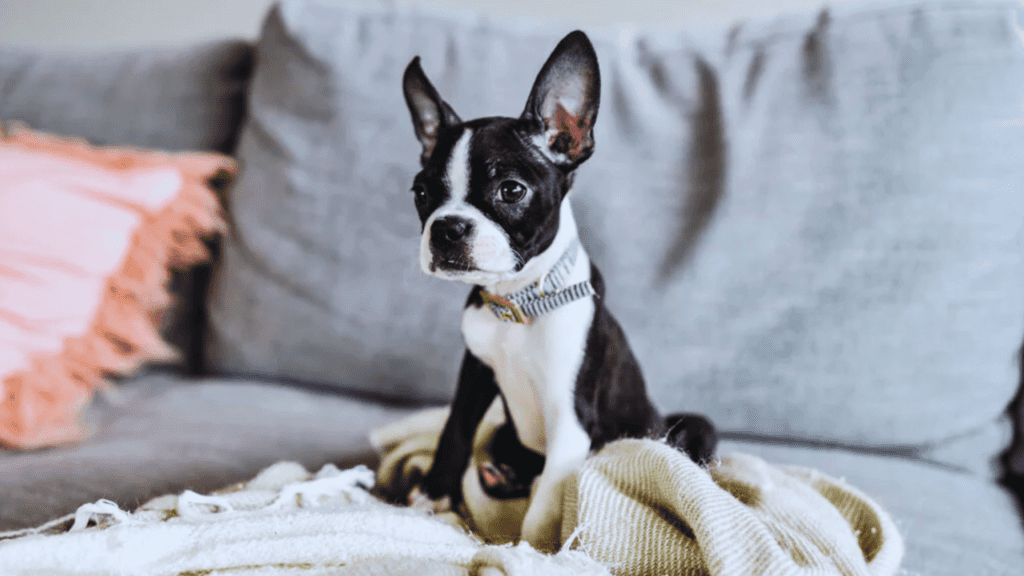
Are you thinking of Bringing Home a Boston Terrier? Its tuxedo markings and charming characters have grabbed the hearts of many.
But before you fall head over heels for those big, round eyes, it’s essential to consider if a Boston Terrier is the right fit for your lifestyle.
Are Boston Terriers a good fit for your lifestyle?
This lively breed loves being with people and having fun. Whether you live in a big apartment or a house with a yard, a Boston Terrier can fit in well.
Even though they are small, they have a lot of energy. Think about how active you are. Do you like daily walks and playtime? If so, a Boston Terrier could be perfect for you.
These little bundles of energy need a way to burn off that energy, and an active owner is ideal for a Boston Terrier.
If you’re a first-time dog owner, don’t worry! Boston Terriers are intelligent and eager to please, making them good choices for new dog parents.
Are Boston Terriers A Perfect Fit for Families?
Absolutely! Boston Terriers are very affectionate and playful, making them great friends for children. Like with any dog, care is essential, but Bostons are usually gentle and tolerant with kids.
They also get along well with other pets, especially if socialized early. Their small size makes them perfect for families with limited space, but remember, their playful nature still needs an outlet!
Boston Terriers can be wonderful companions, bringing a lovely blend of affection, playfulness, and adaptability. But it’s essential to be realistic about your lifestyle and where you live.
With a bit of planning and enough exercise, a Boston Terrier could be the ideal furry friend to bring happiness to your life.
A Rich History Of Boston Terrier
With its tuxedo coat and expressive eyes, the Boston Terrier boasts a surprisingly rich history. Unlike many popular breeds with roots across continents, the Boston Terrier is proudly American-made. Their story begins in the mid-1800s in, you guessed it, Boston, Massachusetts.
These charming little dynamos were initially bred from a dog named “Hooper’s Judge,” a brindle and white terrier mix. Judge, believed to be a cross between an English Bulldog and a white English Terrier, was likely used for ratting, a common practice at the time.
Through careful breeding, breeders aimed to refine Judge’s physique and temperament, focusing on creating a smaller, more companionable dog.
Boston Terrier fact: the Boston Terrier wasn’t always called a Boston Terrier! They were initially known as the “Round-Headed Bull and Terrier.” Thankfully, the more refined and memorable “Boston Terrier” eventually stuck.
Types of Boston Terriers (Actually, There’s Just One!)
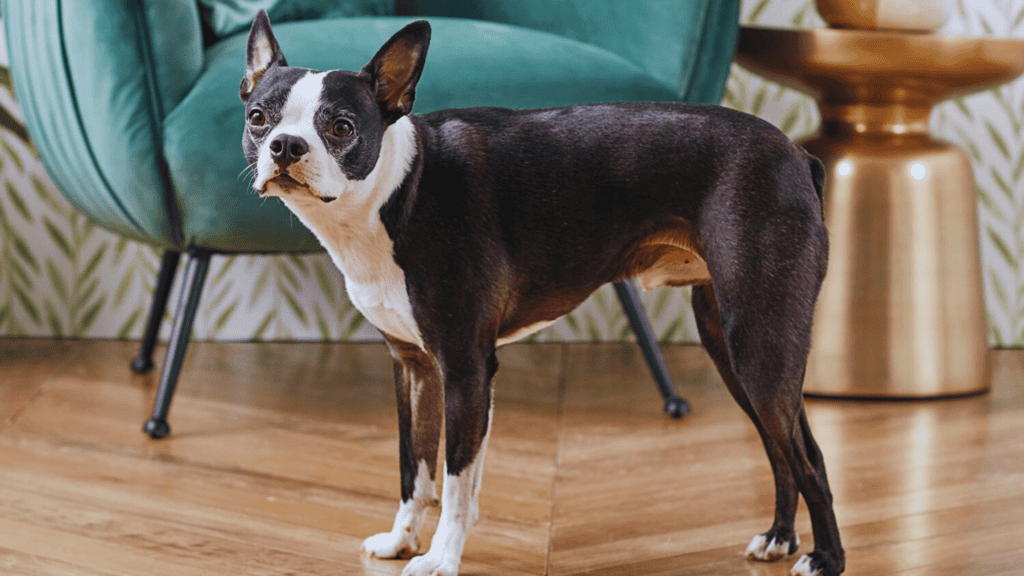
While there aren’t distinct sub-types of Boston Terriers like some breeds have (think working Labrador vs. show Labrador), there is some variation within the breed standard. There are 3 AKC recognized Colored Boston Terriers and 3 Non Recognized available. The American Kennel Club (AKC) recognizes Boston Terriers in three weight classes:
- Under 15 pounds (7 kilograms)
- 15 pounds and under 20 pounds (seven to nine kilograms)
- 20 pounds and not exceeding 25 pounds (nine to 11 kilograms)
The size variation allows potential owners to find a Boston Terrier that best suits their lifestyle and living space.
Size Matters: Ideal Weight and Height
As a small breed, Boston Terriers have specific health needs. Ideally, their height at the withers (shoulders) should be between 15 and 17 inches (38 and 43 cm). Weight is a crucial factor for their overall health, and according to the AKC breed standard, a Boston Terrier should not exceed 25 pounds.
Boston Terrier characteristics
The Boston Terrier has a unique tuxedo-like coat and a friendly, alert expression, making it easily recognizable. These dogs are known for being affectionate and lively, which makes them beloved companions for many people. Let’s explore what makes the Boston Terrier truly special.
Physical Appearance
When you see a Boston Terrier, you’ll probably be charmed by its particular “tuxedo coat.” This means it has a base color of black, brindle, or dark brown, with clear white spots.
The white usually covers their chest and muzzle (making a cute “button nose“) and goes partially up their legs. Some Bostons might also have a white mark on their forehead, giving them even more personality.
Nature lovers, rejoice! Boston Terriers are born with naturally short tails, unlike some breeds that have theirs docked. These cute little stubs, also called “screw tails” or “button tails,” make them even more adorable and add to their cheerful nature. When a Boston Terrier’s tail wags, it’s a clear sign of excitement and friendliness.
Temperament
Though their appearance is certainly eye-catching, the natural charm of a Boston Terrier shines through in their personality. These loving and fun-loving dogs thrive on being with people. They’re intelligent and keen to make you happy, so they’re usually well-behaved and easy to train.
Boston Terriers love to play and cuddle. They’re fun and might bark more when alone or feel alert. But you can teach them not to bark too much with regular training and by being supportive.
Caring for Your Boston Terrier

Bringing a Boston Terrier into your life is a decision filled with joy. These spunky companions offer endless entertainment and unwavering affection. But just like any dog, proper care is essential to ensure your Boston Terrier thrives.
Let’s explore some key aspects of Boston Terrier. Ensure your furry friend stays happy and healthy.
Boston Terrier Lifespan and Health
Boston Terriers can live happily for about 11 to 13 years with good care. But there are some health issues specific to the breed to watch out for. Boston Terriers, like many dogs with flat faces, are likelier to have Brachycephalic syndrome.
This condition affects their breathing due to the shortened airways in their tiny noses. Symptoms can include snoring, snorting, and difficulty breathing, especially during exercise or hot weather.
Another thing to watch for is their eye health. Boston Terriers might get cherry eye, where the tear gland sticks out, or dry eye, which means they don’t make enough tears. Regularly taking them to the vet is vital to catch and care for these problems early.
Building a Healthy Routine
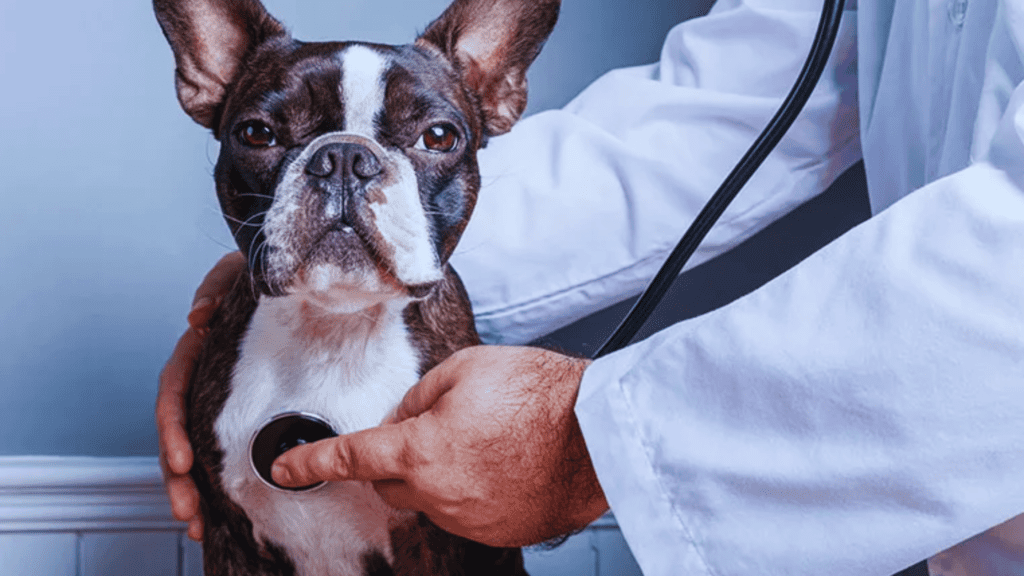
Regular vet visits and ensuring Boston Terriers eat well and get enough exercise are essential for caring for them. Your vet can help you determine the best food for your dog’s age and how much it moves around. They’ll also look for any health problems.
Talking about keeping active, even though Boston Terriers are small, they’ve got lots of energy! It’s essential to take them for walks daily, play with them, and give them things to do that make them think. This keeps them healthy in body and mind.
Daily Needs
Boston Terriers are small in size but big in personality. To ensure your beloved pet stays joyful and in good health, it’s essential to understand their daily requirements:
Grooming requirements
The good news is that Boston Terriers have relatively low maintenance in terms of grooming. Their short, smooth coat sheds moderately and requires brushing only a few times a week with a soft-bristled brush or a grooming mitt.
This routine helps remove loose hair and spreads the oils that keep their fur shiny and healthy. Don’t forget to clean the cute wrinkles on their faces! A damp cloth can keep them tidy and prevent them from getting sore.
Exercise needs
Don’t be tricked by their small size! Boston Terriers have a lot of energy. Walking and playing with them daily is essential to keep them physically and mentally active.
Try to take your Boston Terrier for a decent walk every day, and also play with them inside or play games together. Because of their flat faces, Boston Terriers are more likely to have breathing problems.
So, avoid making them exercise too much or go for walks when it’s boiling because that can make breathing harder for them.
Nutritional considerations
Providing your Boston Terrier with a high-quality diet formulated for small breeds is crucial. These foods are packed with the nutrients they need to maintain their energy levels and overall health. Consult your veterinarian to determine the best food for your dog’s age, activity level, and potential health concerns.
How To Keep Your Boston Comfortable?
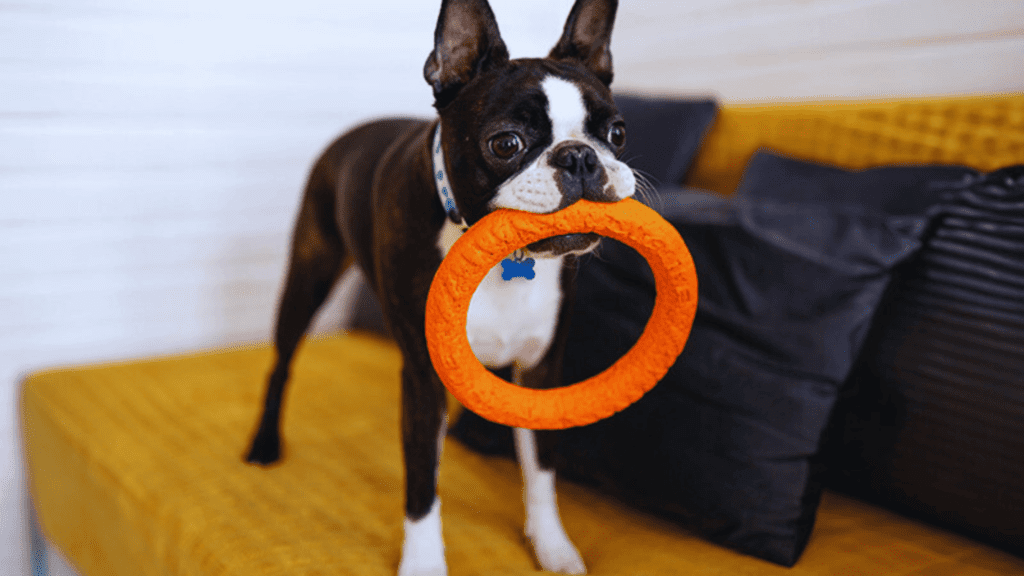
Boston Terriers are sensitive to very hot or very cold temperatures. Because their noses are short, they also can’t control their body temperature. So, it’s essential to be careful when you take them for walks or play outside, choosing more excellent times like mornings or evenings.
Ensure your Boston always has fresh, cool water and sweltering days. You might want to use a cooling vest to keep them comfortable during walks when it’s hot. And in cold weather, get them a warm sweater to wear on walks to keep them cozy.
Caring for a Senior Boston Terrier
As your Boston Terrier ages, its needs might change. They might not want to be as active and have more health problems. So, you might need to take it for shorter walks and play with it more gently.
It’s essential to take senior Bostons to the vet regularly so the vet can find and take care of any health problems early on. Senior Bostons might also like having a softer bed or ramps to help them get around the furniture.
Boston Terrier Training and Socialization
Boston Terriers are famous for their cute appearance and fun-loving attitude, but they’re also smart and want to make you happy, which makes them usually easy to teach.
Because they love being around people, building a solid relationship with your Boston Terrier is easy. Let’s look at some crucial parts of teaching and getting them used to being around others.
Quick learners
The good news is that Boston Terriers are quick learners! Their intelligence and desire to please make them receptive to training. Positive reinforcement methods, which reward good behavior with treats, praise, or playtime, are highly effective with this breed.
This teaches them desired behaviors and strengthens the positive association between you and training sessions. Remember, consistency is key! Use clear commands, practice regularly, and celebrate their successes.
Socialization for Building Confidence
Socializing your Boston Terrier puppy early on is crucial. Expose them to various people, animals, sights, and sounds before 16 weeks of age to help them become confident adult dogs.
Enroll your puppy in puppy socialization classes, take them on outings to dog-friendly stores or parks, and invite friends and family to visit. Positive socialization experiences help prevent fear-based behaviors like excessive barking or shyness later in life.
Possible Challenges May You Face
Boston Terriers usually want to make you happy, but sometimes they can be stubborn. Patience and guiding them in the right direction are essential when that happens.
Their playful nature sometimes translates to mouthing or nipping, especially during puppyhood. Positive reinforcement training and providing them with appropriate chew toys can help curb this behavior.
Having Fun with Your Boston Terrier: Fun, Facts, and Forever Friends
Living with a Boston Terrier is an exciting journey! These lively little companions are always full of surprises, from their playful and energetic nature to their charming and distinctive traits.
Let’s uncover some fascinating facts, discover entertaining activities, and delve into the best ways to embrace a Boston Terrier into your life responsibly.
Fun Facts and Boston Terrier Trivia
- Did you know the Boston Terrier is the official state dog of Massachusetts? Talk about hometown pride!
- Although known for their tuxedo coats, Boston Terriers can also have brindle markings.
- A famous Boston Terrier named “Whisper” stole the Westminster Kennel Club Dog Show in 1913, becoming the first non-British Bulldog to win the prestigious event.
- Celebrities can’t resist their charm either! Ryan Reynolds, Martha Stewart, and Leonardo DiCaprio are just a few stars spotted with Boston Terrier companions.
Activities and Games For Pet
Boston Terriers are known for their playful and intelligent nature, requiring mental and physical stimulation to keep them happy. To keep your furry friend entertained, here are some enjoyable activities and games to consider:
- Fetch: A classic for a reason! Most Boston Terriers love chasing after a ball or frisbee.
- Hide and Seek: Their playful nature makes them natural at this game. Hide a favorite toy and watch them excitedly sniff it out.
- Agility Course: Their intelligence and athleticism shine in agility courses. Start with an introductory homemade course in your backyard and gradually increase the difficulty.
- Brain Games: Interactive puzzles and treat-dispensing toys challenge their minds and keep them occupied.
Boston Terrier Adoption
Finding a good breeder is essential if you’re considering getting a Boston Terrier puppy. Good breeders care a lot about the health and behavior of their dogs, so you’ll get a happy, healthy puppy. Look for breeders who check the dogs’ health and ensure their puppies spend time around people and other dogs.
Many cute Boston Terriers are in shelters, waiting for someone to give them a forever home. Think about adopting one! These shelters usually have grown-up dogs that are already trained and want affection. Adopting gives a dog a new shot at a happy life, and you might find your ideal furry friend.
Conclusion
The Boston Terrier’s charm goes beyond their tuxedo coat and captivating eyes. These intelligent and playful companions offer a delightful combination of affection, enthusiasm, and adaptability.
They thrive on companionship, perfect for families or individuals seeking a loyal and loving furry friend. Their eagerness to please makes them generally well-suited for training, while their playful spirit ensures a lifetime of entertainment.
If you’re considering getting a Boston Terrier, there’s much help. Look up good breeders or shelters nearby. Soon, you’ll have a new friend full of love and character. Whether you’ve had dogs before or not, a Boston Terrier can be a great new buddy for you.
Do you already have a Boston Terrier companion gracing your life with joy? We’d love to hear about your experiences! Share your stories and photos of your furry friend online, and spread the Boston Terrier love.
Some Essential Resources for Boston Terrier Owners
- The American Kennel Club (AKC): https://www.akc.org/dog-breeds/boston-terrier/ provides a wealth of information on Boston Terriers, from breed standards to health and care tips.
- The Boston Terrier Club of America (BTCA): https://bostonterrierclubofamerica.org/ is the breed’s national parent club, offering resources, rescue information, and a community for Boston Terrier enthusiasts.
- The Boston Terrier Network: https://www.facebook.com/nebtr/ is a non-profit rescue organization dedicated to Boston Terriers in need.pen_spark

